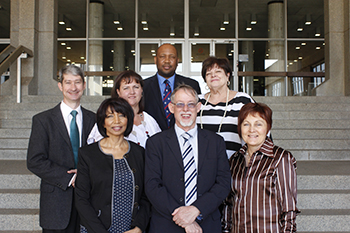Latest News Archive
Please select Category, Year, and then Month to display items
12 January 2024
|
Story Nonsindiswe Qwabe
|
Photo Sonia Small
 Since joining the UFS in 2008, Dr Grey Magaiza has worked extensively on approaches that can foster the socio-economic transformation of societies.
Since joining the UFS in 2008, Dr Grey Magaiza has worked extensively on approaches that can foster the socio-economic transformation of societies.
“The future should be one where communities can decide on their development agenda and futures. That’s the most important for me.” Dr Grey Magaiza, Deputy Director of the Centre for Gender and Africa Studies (CGAS) and Head of the Community Development programme on the Qwaqwa Campus, is passionate about capacitating communities to be agents of change and advancement. His vision for the future emphasises the empowerment of communities to take charge of their development by actively participating in decision making and the implementation of development projects that can improve their lives.
Since joining the UFS in 2008, Dr Magaiza has worked extensively on approaches that can foster the socio-economic transformation of societies. Over the years, he has crafted his research speciality into one that he is most proud of – being an interdisciplinary scientist immersed in the development of communities.
“I’m in a fortunate position of researching what I like. I say ‘fortunate’, because I’ve taken the time to understand what I’m passionate about, which is the overall field of rural livelihoods and livelihood futures – in short, community development. My research starts from an engaged university, understanding the elements that a university must use to enhance transformation and relevance to its immediate community in terms of development.”
One of the ways he has done this is by looking at social entrepreneurship as a development approach for young people in a rural setting. Through workshops with non-profit and civic organisations in Qwaqwa, Dr Magaiza has been helping these organisations to map out their needs and actively meet them through the involvement and support of external role players.
“We understand that communities are part of the national development agenda, but even that national agenda respects community knowledge and intentions and allows communities to shape their identity. A critical enabler of this is community organising. You bring back the capacity in communities to have dialogues on issues affecting them as spaces for engagement, knowledge exchange, and for people to just talk about their way forward.”
By enabling communities to define their development agenda, they can address their specific needs, challenges, and aspirations, he said. “When I look at livelihood futures, it’s quite an exciting aspect of my work – it’s like looking into a fortune tellers’ globe, because you’re not deciding for communities what they should do, but the communities themselves take those decisions.”
New schools, restructuring part of streamlined Faculty of Health Sciences
2017-10-12

From the left, front are: Dr Jocelyn Naicker,
Prof Gert van Zyl, Prof Magda Mulder;
back from left: Prof Chris Viljoen,
Marlene Viljoen, Deputy Director: Faculty of Health Sciences;
Prof Nathaniel Mofolo; and Prof Santie van Vuuren.
Photo: Rulanzen Martin
Numerous developments, such as the creation of two new schools and one newly restructured School of Medicine in the Faculty of Health Sciences at the University of the Free State (UFS), will catapult this renowned faculty to even greater heights.
Five-school structure to increase access
A five-school structure was proposed at the annual Faculty Management retreat in July 2016. The previous three-school model included the Schools of Medicine, Nursing, and Allied Health Professions.
The current School of Medicine has been restructured and will henceforth be known as the School of Clinical Medicine. The Schools of Pathology and Biomedical Sciences have been added to the faculty. “So, three new schools were in fact created within the faculty,” said Prof Gert van Zyl, Dean of the faculty.
“There was also a request from the National Health Laboratory Services to group academics that is rendering services in pathology into a new School of Pathology.” This is what motivated the faculty management to create two new schools.
Esteemed academics appointed
With the creation of the new schools, there were also new appointments within the Faculty of Health Sciences. Dr Jocelyn Naicker has been appointed as the new part-time Head of the School of Pathology, Prof Chris Viljoen was appointed as the part-time Head of the School of Biomedical Sciences, and Prof Nathaniel Mofolo as the new Head of the School of Clinical Medicine. Prof Santie van Vuuren remains Head of the School of Allied Health Professions, and Prof Magda Mulder as the head of the School of Nursing.
Research outputs to remain as usual
The addition of the new schools will not impact research output. “In the past, research was done across departmental boundaries between all the departments in the faculty,” Prof Van Zyl said. The advantages of adding two additional schools are that the workload will be distributed among the five schools. The heads of schools will work within their respective disciplines and related areas, and will eliminate the duplication of administrative functions.